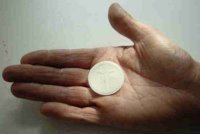I found
Sarah’s comments on the lectionary helpful. Please take moment to read her piece.
Ephesians 5:21-33 has been used to justify the hierarchical arrangement of family life, with the husband as head and the wife as second-in-command. It has been used to justify the deliberate oppression of women in other spheres of life too. Sarah reminds us that this is based on a mistranslation of the original text.
Take, for instance, the New American Standard Version, which places verse 21 (“Submit to each other out of reverence for Christ”) as the concluding line of the previous section which deals generally with how the community should behave with each other. It then inserts a heading and proceeds with the first line of this new section being “Wives submit to your husbands.”
Here are the two ways of rendering the translation of Ephesians 5:20-22:
New American Standard“…always giving thanks for all things in the name of our Lord Jesus Christ to God, even the Father; and be subject to one another in the fear of Christ.
Heading: Marriage Like Christ and the Church
Wives, be subject to your own husband, as to the Lord.”
New Revised Standard Version
“…giving thanks to God the Father at all times and for everything in the name of our Lord Jesus Christ.
Heading: The Christian HouseholdBe subject to one another out of reverence for Christ.
Wives, be subject to your husbands as you are to the Lord.”
The effect in the NRSV is to make verse 21 the introduction of the section dealing with wives and husbands, so that the idea Paul is talking about here is about being
mutually subject to one another in marriage. He then goes on to explain this in detail for wives and then husbands. We are talking about nothing less than a feminist agenda nearly 2000 years before the Suffragettes contemplated it.
It is interesting that Paul uses more space to explain this idea to husbands than to wives. As Sarah reminds us, boys grow up into power, assuming leadership and decision making with relative ease because they are groomed for it. Similarly girls are taught from an early age to be servile. Girls do not easily take on the yoke of power, and wear it uncomfortably when they do. Similarly, boys struggle with humility and serving others. Paul knew this and so spent a little more time explaining this radical idea of mutual service to men who need a little remedial work where humility is concerned. He didn’t spend much time explaining it to wives, as he assumed they were already accomplished. Paul compares the submission of husbands to that of Christ, who, though Divine, humbles himself and becomes a servant of his own creation, even being prepared to die for his beloved.
The other lectionary reading for this week is
John 6:60-69, where Jesus challenges those who find his teaching difficult. It is no wonder that at this point in Jesus ministry people are disappearing back home, no longer able to sustain the hard choices he exacts of his disciples. No wonder! Jesus asks of the 12 if they too will leave and Peter responds, “To whom else can we turn?” An interesting response…
Sarah recalls the story of one of Peter’s first encounters with Jesus. He was fishing that day but had had no luck; his nets always empty. Jesus came near on the beach and shouted to the men in the boat to cast their net on the other side. This would have involved rearranging the configuration of men and nets, a tedious process which would go against the grain as these men would have developed an habitual tendency to use one side of the boat. But eventually realising they had nothing to lose they did so. Suddenly, they cannot find enough hands to bring up the net now heavily laden with fish.
Peter caught a glimpse of what Jesus was offering.
“In other words, in one moment the big question on Peter's mind changed from ‘Will I catch enough fish today to survive?’ to ‘Can I gather enough people to take in all of this abundance?’ That's what made Peter a fisher of people.” (Breuer).
Peter went from the anxiety of his poverty to seeing how this poverty might be reversed. It was this that made him follow Jesus. He wanted a society in which he and people like him, no longer had to look forward to a lifetime of drudgery. This was the reason so many women followed Jesus, because he offered them the “good news” that the oppression they had suffered for so long could be reversed. It is why, even today, the church is still one of the few places where women are over-represented – because here they can exercise power in ways (almost / sometimes / should be) equal to men.
To follow Jesus is always to engage with the possibility of making a world that is more just. But it is always premised on the change beginning personally. If I want to see change in the world, I must be ready to change my own heart.
Peter and his men had to overcome their habits to cast the net on the other side. Then he had to give up his livelihood and spend long months away from his family. Several times he had to completely re-evaluate his world-view. Even after he became the Rock on which Jesus built the church we find Peter caught in a radical realignment of his prejudices as Paul and others force him to grapple with the Gentile question. Eventually, even Peter, the conservative Jew, dispenses with the requirements Jewish law and Gentiles become equal citizens in God’s Kin-dom.
Becoming a Christian is not about arriving. It is about starting a journey in which every day challenges one’s perceptions, habits and prejudices. One can never become comfortable. But the energy for this process of constant revision is afforded by the hope that the world these changes are making is a world worth living in.


